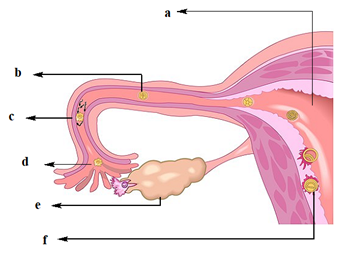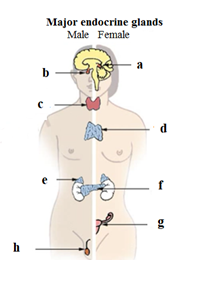Class 8 Science
Reaching the Age of Adolescence


Question 1.
The period of life, when the body undergoes changes, leading to reproductive maturity, is called ____________.
Question 2.
____________ signifies that the human being has become capable of reproduction and it ends when the human has reached the reproductive maturity.
Question 3.
What are the changes that occur during the puberty?
Question 4.
The growing voice box in boys can be seen as a protruding part of the throat called __________.
Question 5.
Name some glands that releases their secretions through ducts.
Question 6.
What are the secondary sexual characters in girls?
Question 7.
What are secondary sexual characters in boys?
Question 8.
How hormones initiate reproductive functions?
Question 9.
Label the given picture.

Question 10.
What are the steps involved in menstrual cycle?
Question 11.
How is the sex of a baby determined?
Question 12.
The thyroid gland is responsible to produce _________.
Question 13.
___________ controls the release of other hormone glands in a human body, including the thyroid and adrenals, the ovaries and testicles.
Question 14.
Match the following.
|
Pituitary Gland |
Responsible to produce insulin. |
|
Adrenal Gland |
Sends orders to the thyroid and adrenals to secrete their respective hormones. |
|
Pancreas |
Responsible to produce correct salt balace in blood and adrenalin that helps to adjust stress in a human body at the time of certain emotions like anger, embarrassment, etc. |
Question 15.
Why presence of iodine in water is important for the frogs?
Question 16.
What are the different things to be taken care of as a part of personal hygiene?
Question 17.
Label the given picture.

Question 18.
When does reproductive age of girls begin and ends?
Question 19.
What happens if fertilisation does not take place in female?
Question 20.
Define menarche.
**********
In summary, problem-solving after learning a theoretical concept on CBSE Reaching the Age of Adolescence Class 8 Science is an essential part of the learning process. It enhances your understanding, critical thinking abilities, and retention of knowledge. Moreover, it equips you with valuable skills that are applicable in academic, personal, and professional contexts.
You must have heard of the phrase “Practice makes a man perfect”. Well, not just a man, practice indeed enhances perfection of every individual.
Practicing questions plays a pivotal role in achieving excellence in exams. Just as the adage goes, "Practice makes perfect," dedicating time to solve a diverse range of exam-related questions yields manifold benefits. Firstly, practicing questions allows students to familiarize themselves with the exam format and types of problems they might encounter. This familiarity instills confidence, reducing anxiety and improving performance on the actual exam day. Secondly, continuous practice sharpens problem-solving skills and enhances critical thinking, enabling students to approach complex problems with clarity and efficiency. Thirdly, it aids in identifying weak areas, allowing students to focus their efforts on improving specific topics. Moreover, practice aids in memory retention, as active engagement with the material reinforces learning. Regular practice also hones time management skills, ensuring that students can allocate appropriate time to each question during the exam. Overall, practicing questions not only boosts exam performance but also instills a deeper understanding of the subject matter, fostering a holistic and effective learning experience.
All About Daily Practice Problems on Class 8 Science Reaching the Age of Adolescence NCERT Chapter 10
Our Daily Practice Problems (DPPs) offer a diverse range of question types, including Multiple Choice Questions (MCQs) as well as short and long answer types. These questions are categorized into Easy, Moderate, and Difficult levels, allowing students to gradually progress and challenge themselves accordingly. Additionally, comprehensive solutions are provided for each question, available for download in PDF format - Download pdf solutions as well as Download pdf Questions. This approach fosters a holistic learning experience, catering to different learning styles, promoting self-assessment, and improving problem-solving skills. With our well-structured DPPs, students can excel in exams while gaining a deeper understanding of the subject matter. Hope you found the content on Class 8 Science Reaching the Age of Adolescence NCERT Chapter 10 useful.
Last but not least, to get the best hold on Class 8 Science Reaching the Age of Adolescence NCERT Chapter 10, do not forget to check out: